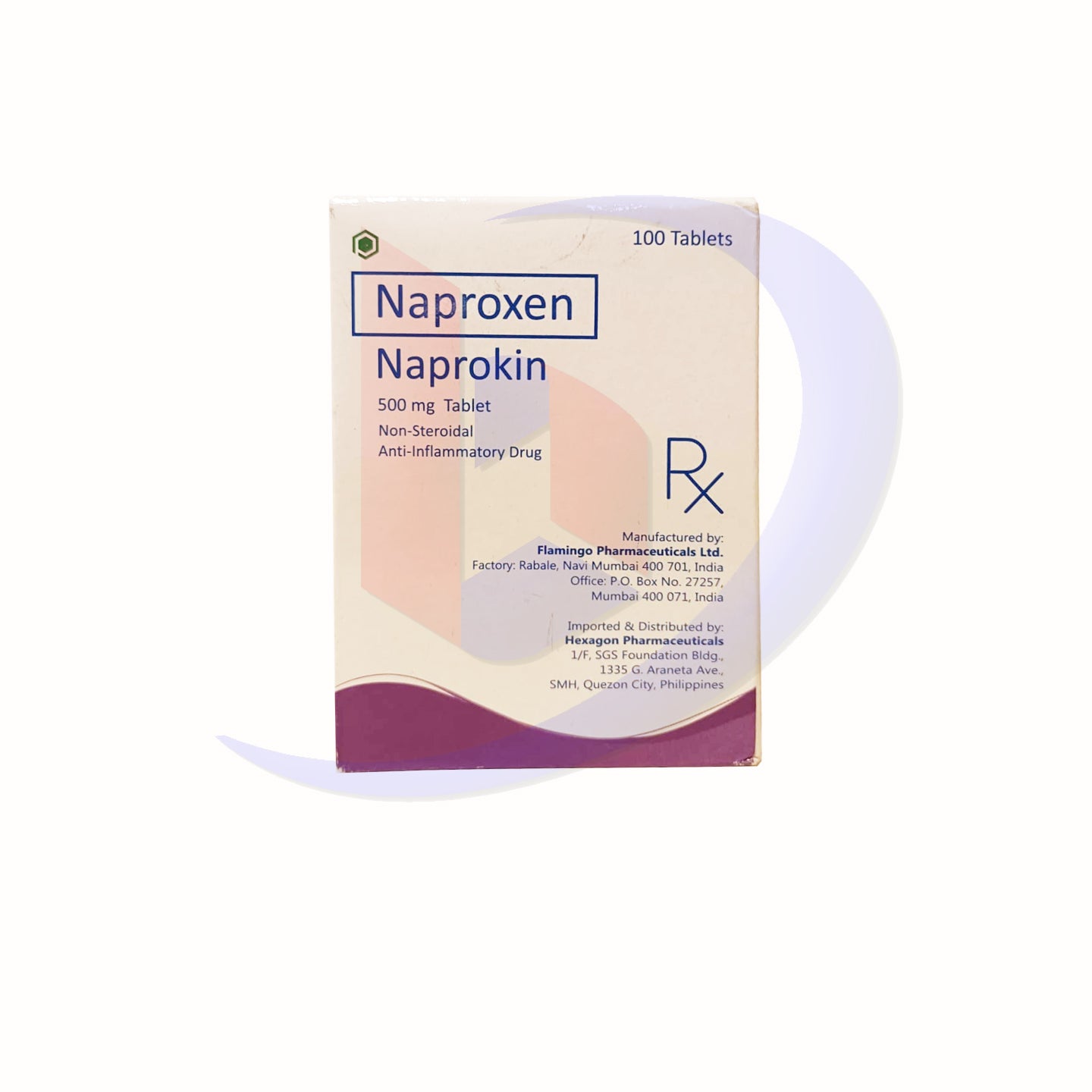Bambang Pharmaceutical Depot Inc.
Naproxen (Naprokin) 500mg Non Steroidal Tablet 100's
Naproxen (Naprokin) 500mg Non Steroidal Tablet 100's
Couldn't load pickup availability
Product Description:
Naproxen (Naprokin) 500mg is a nonsteroidal anti-inflammatory drug (NSAID) used to reduce inflammation, pain, and fever. Naproxen works by inhibiting the activity of cyclooxygenase enzymes (COX-1 and COX-2), which are involved in the production of prostaglandins that promote inflammation and pain. This makes Naprokin effective for treating a variety of inflammatory conditions, including arthritis, musculoskeletal pain, and menstrual discomfort.
Each Naprokin tablet contains 500mg of Naproxen. It is typically taken orally, and it is often prescribed for short-term management of acute pain or for long-term management of chronic inflammatory conditions.
Indications:
Naproxen (Naprokin) 500mg is indicated for:
-
Pain Relief:
-
Used for the management of mild to moderate pain, including headaches, dental pain, musculoskeletal pain (e.g., sprains, strains), and post-surgical pain.
-
-
Arthritis:
-
Osteoarthritis: To reduce pain, swelling, and stiffness.
-
Rheumatoid Arthritis: For reducing inflammation and improving joint function.
-
Ankylosing Spondylitis: Used to relieve symptoms of this chronic inflammatory arthritis.
-
-
Menstrual Pain (Dysmenorrhea):
-
Used for relieving menstrual cramps and related pain during menstruation.
-
-
Gout:
-
For the relief of acute gout attacks, which can be very painful.
-
-
Fever:
-
Naproxen is also used to reduce fever caused by infections or other illnesses.
-
-
Tendinitis and Bursitis:
-
Effective in managing inflammation and pain associated with tendinitis (inflammation of tendons) and bursitis (inflammation of fluid-filled sacs near joints).
-
Dosage:
The recommended dosage of Naproxen (Naprokin) 500mg depends on the condition being treated:
For Pain or Inflammation:
-
Initial dose: 500mg as a single dose, or 250mg every 6-8 hours.
-
If needed, the dose may be increased up to 1000mg per day, with a maximum dose of 1500mg per day in divided doses.
For Osteoarthritis and Rheumatoid Arthritis:
-
Initial dose: 500mg to 1000mg daily, given as a single dose or in divided doses.
-
The usual dose is 500mg to 1000mg daily, depending on the severity of the condition.
For Gout:
-
Initial dose: 750mg followed by 250mg every 8 hours for the next 3-4 days, or as prescribed by a doctor.
For Menstrual Pain:
-
Initial dose: 500mg at the onset of symptoms, followed by 250mg every 6-8 hours if needed.
Note: The lowest effective dose for the shortest duration should be used to minimize the risk of side effects. Naproxen should be taken with food or milk to reduce gastrointestinal irritation.
Side Effects:
Common side effects of Naproxen (Naprokin) include:
Common Side Effects:
-
Gastrointestinal upset: nausea, vomiting, indigestion, and abdominal discomfort.
-
Heartburn or acid reflux.
-
Headache.
-
Dizziness or lightheadedness.
-
Rash or skin reactions.
Serious Side Effects:
-
Gastrointestinal bleeding or ulceration: Prolonged use of NSAIDs like Naproxen can lead to stomach ulcers or bleeding, which can be severe and require immediate medical attention.
-
Kidney damage: Long-term use may lead to kidney issues such as decreased kidney function or kidney failure.
-
Cardiovascular problems: There may be an increased risk of heart attack, stroke, and high blood pressure, particularly with long-term or high-dose use.
-
Severe allergic reactions: Difficulty breathing, swelling of the face, lips, tongue, or throat.
-
Liver damage: Symptoms may include dark urine, jaundice (yellowing of the skin or eyes), and severe fatigue.
-
Severe dizziness or fainting.
-
Blood disorders: Rarely, Naproxen can cause a reduction in blood cells, leading to symptoms like fatigue, unusual bruising, or bleeding.
Other Possible Side Effects:
-
Fluid retention: Swelling in the legs or ankles, weight gain.
-
High blood pressure.
-
Tinnitus: Ringing in the ears.
-
Mental confusion or mood changes.
Contraindications:
Naproxen (Naprokin) should not be used in the following situations:
-
Hypersensitivity:
-
Allergic reaction to Naproxen or any of the other ingredients in the tablet.
-
-
Active Gastrointestinal Bleeding:
-
Naproxen should not be used in patients with a history of gastrointestinal bleeding, peptic ulcer disease, or other serious gastrointestinal conditions.
-
-
Severe Liver Disease:
-
Contraindicated in patients with severe hepatic impairment, as it can exacerbate liver damage.
-
-
Severe Kidney Impairment:
-
Contraindicated in patients with severe renal insufficiency (kidney failure), as Naproxen may worsen kidney function.
-
-
Heart Failure:
-
Not recommended for patients with severe heart failure, as NSAIDs can exacerbate fluid retention and worsen heart failure.
-
-
Third Trimester of Pregnancy:
-
Naproxen is contraindicated during the third trimester of pregnancy due to the risk of premature closure of the fetal ductus arteriosus, a blood vessel necessary for fetal circulation.
-
It should be used cautiously in the first and second trimesters, only if the benefits outweigh the risks.
-
-
History of Asthma or Allergic Reactions to NSAIDs:
-
Naproxen should be avoided in patients with aspirin-sensitive asthma or a history of severe allergic reactions to NSAIDs (e.g., anaphylaxis, angioedema).
-
-
Pregnancy and Breastfeeding:
-
Naproxen should be used during pregnancy only if clearly needed and under medical supervision. It is generally not recommended during breastfeeding as it may pass into breast milk.
-
-
Children Under 12:
-
The safety and efficacy of Naproxen in children under 12 years old have not been well established, so it is generally not recommended in this age group unless prescribed by a healthcare provider.
-
Precautions:
-
Cardiovascular risks: NSAIDs like Naproxen can increase the risk of cardiovascular events (heart attack or stroke), especially when used in high doses or for prolonged periods. Patients with existing heart conditions should use this medication with caution.
-
Gastrointestinal risk: Long-term use of Naproxen can lead to ulcers, bleeding, or perforation in the stomach or intestines, which can be fatal. The risk is higher in older adults and those with a history of gastrointestinal issues.
-
Kidney function: Naproxen can impair kidney function, particularly in those who are dehydrated or have pre-existing kidney conditions.
-
Elderly patients: Older adults are at increased risk for side effects such as gastrointestinal bleeding, renal impairment, and cardiovascular problems, so they should be monitored closely.
-
Alcohol: Avoid excessive alcohol consumption while using Naproxen, as it can increase the risk of gastrointestinal bleeding.
Drug Interactions:
Naproxen (Naprokin) may interact with other medications, including:
-
Anticoagulants (e.g., warfarin):
-
Naproxen may increase the risk of bleeding when taken with anticoagulants.
-
-
Other NSAIDs:
-
Combining Naproxen with other NSAIDs (including over-the-counter medications like ibuprofen) can increase the risk of gastrointestinal bleeding and ulcers.
-
-
Antihypertensive drugs:
-
Naproxen can reduce the effectiveness of ACE inhibitors, angiotensin II receptor antagonists, and diuretics, potentially leading to higher blood pressure.
-
-
Lithium:
-
Naproxen may increase blood levels of lithium, increasing the risk of lithium toxicity.
-
-
Methotrexate:
-
Co-administration of methotrexate with Naproxen may increase the toxicity of methotrexate.
-
-
Corticosteroids:
-
Concurrent use of steroids and Naproxen can increase the risk of gastrointestinal ulcers and bleeding.
-
-
Diuretics:
-
Naproxen may reduce the effectiveness of diuretics, increasing the risk of fluid retention and kidney issues.
-
Conclusion:
Naproxen (Naprokin) 500mg is a potent NSAID that is widely used to treat pain, inflammation, and fever, particularly in conditions like arthritis, musculoskeletal pain, and menstrual discomfort. It should be used cautiously, especially in individuals with a history of gastrointestinal issues, kidney problems, heart disease, or hypertension. Always follow the prescribed dosage and consult a healthcare provider for any concerns, especially in cases of long-term use.
Share

Product Features
Highlights
Details
Lot #
Expiry Date
"For All Your Pharma And Medical Supply Needs"
-
MEDICINES
We offer large range of generics and branded tablets, capsules, topicals, suppositories, drops or suspensions, inhalers and injections.
-
SUPPLEMENTS
High quality yet very affordable vitamins and minerals, specialty supplements, herbals and botanicals, sports nutrition, and weight management.
-
MEDICAL SUPPLIES
We serve all types of medical supplies needed in clinics, laboratories, and hospitals like cottons, gauze, alcohol, swabs, gloves, bandages, lancets, glucometer, etc.
-
MEDICAL EQUIPMENT
We also serve durable and affordable medical devices and equipment needed in clinics, laboratories and hospitals.
Subscribe to our emails
Be the first to know about new collections and exclusive offers of Bambang Pharmaceutical Depot Inc.


